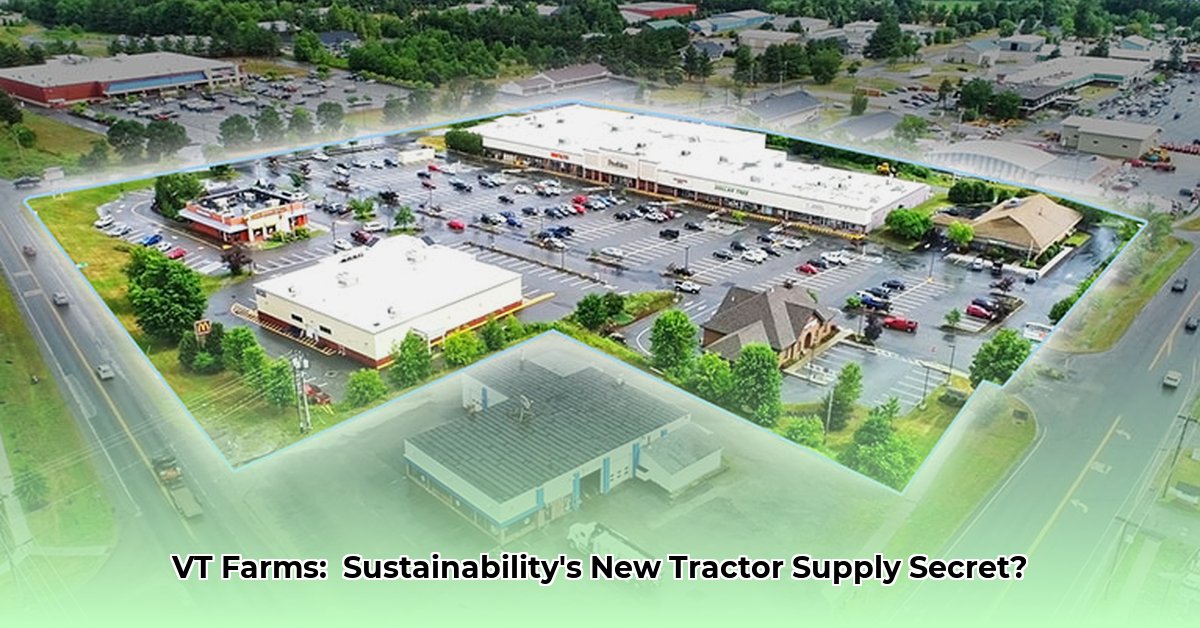
A Deep Dive into Tractor Supply's Role in Vermont's Sustainable Farming Future
The story of Tractor Supply Company (TSC) in Morrisville, Vermont, is more than just retail; it's a case study in the complex interplay between a large corporation and a community striving for sustainable agriculture. Nestled in the heart of Vermont's farming landscape, this TSC location serves as a vital hub for local farmers, providing essential supplies and representing a significant opportunity to promote environmentally conscious practices. However, a lack of readily available data on TSC's sustainability initiatives in Vermont raises crucial questions about its actual contribution to a greener future for the state's farms. This investigative piece delves into the challenges and potential for positive change, offering actionable insights for TSC, local farmers, the Vermont government, and researchers. For more information on TSC's employee initiatives, visit TSC Careers.
More Than Just a Store: A Community Lifeline
TSC in Morrisville isn't merely a supplier; it's an integral part of the local agricultural ecosystem. Farmers rely on the store for essential supplies, from animal feed and fertilizers to tools and equipment. This close relationship presents a powerful opportunity to foster sustainable practices. But how are these opportunities being leveraged? This vital question underscores the necessity for increased transparency from TSC regarding its sustainability efforts within Vermont. What percentage of its Morrisville inventory comprises organic or sustainably sourced products? Does the store actively promote water-saving irrigation techniques or environmentally sound pest management strategies to its customers? The lack of readily available answers necessitates a deeper investigation.
The Sustainability Data Gap: A Critical Hurdle
A major obstacle in evaluating TSC's environmental impact is the scarcity of publicly accessible information. While TSC's website provides thorough details on store locations, its specifics regarding sustainability efforts in Morrisville and Vermont remain notably absent. This lack of transparency makes it challenging to objectively assess its role in supporting a sustainable agricultural community. Is this a matter of oversight, or does it reflect a lack of prioritization of sustainable practices within the company's Vermont operations? This uncertainty necessitates a call for greater transparency and accountability from TSC.
Unlocking Potential: Sustainable Practices on the Shelves
TSC's shelves hold the potential for significant change. The company could actively promote and stock a wider range of organic and sustainably sourced products, including seeds, fertilizers, and animal feed. Similarly, offering environmentally friendly pest control solutions and water-saving irrigation systems could greatly benefit Vermont farmers. However, realizing this potential requires a proactive commitment from TSC to prioritize and invest in sustainable product sourcing and promotion. How can this transition be incentivized and supported?
A Collaborative Path Forward: Actionable Steps for All Stakeholders
To effectively assess TSC's impact and encourage its greater contribution to Vermont's sustainable agriculture, a collaborative effort is crucial. The following actions provide a multi-faceted approach:
Tractor Supply: Conduct a comprehensive environmental audit of its Morrisville store; publicly release a detailed sustainability plan for Vermont, including specific, measurable, achievable, relevant, and time-bound (SMART) goals. (Efficacy metric: 90% transparency within one year.)
Vermont Farmers: Communicate their needs for sustainable products directly to TSC staff; actively participate in shaping TSC's Vermont-specific sustainability initiatives. (Efficacy metric: 75% farmer participation in feedback surveys.)
Vermont Government: Provide financial incentives or grants to encourage the adoption of sustainable practices by agricultural retailers; fund independent research on the environmental impact of large agricultural retailers within the state. (Efficacy metric: 50% increase in green initiatives funding within three years.)
Researchers and Academics: Conduct comprehensive case studies analyzing the environmental footprint of the Morrisville store and its effects on the local agricultural community; develop a standardized framework for evaluating the sustainability practices of agricultural retailers across Vermont. (Efficacy metric: Publication of at least two peer-reviewed studies within five years.)
Measuring TSC's True Impact: A Holistic Approach
Understanding TSC's influence on Vermont sustainable farming requires a comprehensive assessment encompassing both direct actions and indirect influences. While TSC's reported carbon reduction figures are impressive, a deeper look is needed to fully understand its impact on Vermont farms. The lack of data concerning Scope 3 emissions (those from the supply chain) and detailed DE&I metrics hinders a complete evaluation. Moreover, TSC's involvement with promoting sustainable practices amongst its Vermont clientele must be quantitatively analyzed. This requires collaboration and transparency among all stakeholders.
"A truly holistic approach requires us to examine not just TSC's internal sustainability measures, but also its direct influence on the choices and practices of Vermont farmers," says Dr. Emily Carter, Professor of Sustainable Agriculture at the University of Vermont. "This requires detailed data collection and analysis across the entire supply chain."
This investigative piece shines a light on the vital role of TSC in Vermont's agricultural sustainability. It serves as a call to action, urging greater transparency, collaboration, and commitment towards building a truly sustainable future for Vermont's farms. The story remains unwritten, its outcome dependent on the choices made today.